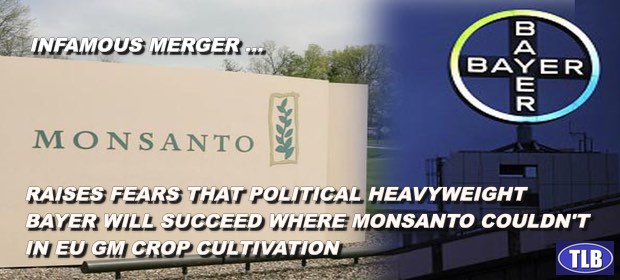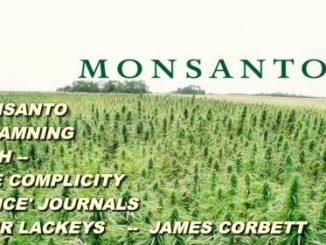
Critics fear the takeover of Monsanto by Bayer would create a GMO juggernaut too powerful for Europe to resist, while conveniently “disappearing” a tarnished brand. Concerns abound over concentration in the seed market.
DW

Monsanto has been the target of worldwide protests
This past May, environmentalists amassed in cities around the world once again for their annual “March Against Monsanto,” which for four years has been protesting the world’s most infamous producer of genetically modified crops. But next year, the demonstrators will no longer have a Monsanto to protest against.
The protestors haven’t succeeded in shutting the company down. On the contrary, the firm has become so successful that one of Germany’s largest companies has acquired it for $66 billion (59 billion euros).
Monsanto’s merger with Bayer, the international chemical and pharmaceutical company most famous for producing Aspirin, is the largest-ever foreign takeover bid from a German company. Both companies produce pesticides, and together would control 28 percent of the global pesticide market. Bayer’s offer was sealed on Wednesday (14.09.2016).
The size of the combined company will invite close scrutiny by competition regulators. But its potentially dominant position in the agrochemical field has also raised alarm on environmental grounds.
Opponents are now pinning their hopes on the European Commission in Brussels, which still must approve or reject the merger.
But Jan Pehrke from the German nongovernmental organization Coalition Against Bayer-Dangers says a rejection is highly unlikely. “I think we can’t stop the merger at this point, it’s done,” he says.
The commission is likely to act, he thinks – but added that this probably won’t do enough. “They may force Bayer to sell its cotton business, or some of its pesticide businesses, because of competition concerns. But they can’t force a rollback of the new combined concentration in the market,” Pehrke told DW.
Burying a tarnished brand
The reaction has been particularly strong in Germany, where the German public is widely opposed to genetically modified crops, or GMOs. US-based Monsanto pulled out of the GMO market in Europe years ago because of the EU’s de facto moratorium on growing such crops. But the company continues to be involved in importing GMO crops into the EU.
Monsanto has become the main target of the anti-GMO movement globally – particularly in Europe, where it faces ongoing controversy over its most widely-used weed killer glyphosate, which environmentalists continue to seek to ban.
Although EU authorization for glyphosate ran out this past June, the European Commission gave it a provisional extension, for 18 months.

One of Monsanto’s key products – glyphosate – faces a possible ban by the EU
Many observers expect Bayer to drop the Monsanto name. Asked by the German newspaper “Frankfurter Allgemeine Sonntagszeitung” whether Bayer would bury the Monsanto brand, Bayer chief executive Werner Baumann had said: “Suffice to say that Bayer enjoys an excellent reputation and appeal worldwide. We must take advantage of that.”
Though Bayer is involved in many of the same activities, it has escaped negative public perception in Europe that its American counterpart has.
Jan Perhke, who is also with the Coalition Against Bayer-Dangers, says it has been harder to make the public aware of Bayer’s pesticide activities because it is involved in more diversified activity than Monsanto – which deals mostly in seeds and GMOs.
“We have tried to put the focus not only on Monsanto, and to let people know that behind Monsanto there are many agrochemical multinationals which are very big and also have very dangerous products,” he told DW.
He worries that with the relatively less-tarnished and more politically powerful Bayer name behind the Monsanto GMO products, the European Union will not be able to maintain its Two-thirds of EU states to ban GM crop cultivation de facto moratorium# on growing genetically modified crops.
“We are now afraid that if a big German enterprise like Bayer is so big in GMOs, there will be more pressure to put GMOs on the EU market,” he says. Bayer has known that there will be protests, Pehrke thinks.
“They have announced that they will offer a tour to investors to tell them why the merger is good, and why the bad reputation of Monsanto isn’t going to have an influence on the profits of Bayer.”

Bayer executives say they are willing to meet with environmentalists to discuss their concerns
Lessons learned
For their part, Bayer executives appear keen to avoid early mistakes that led to Monsanto having such an image problem in Europe – such as a lack of engagement with policy-makers and environmental groups. Baumann told the “Frankfurter Allgemeine Sonntagszeitung” that the company is inviting campaigners to talk to Bayer’s management.
“As much as I talk to our investors to convince them of the plans, the offer also stands for environmental groups and other nongovernmental organizations,” he had told the newspaper. “Our way of doing business may differ from the way Monsanto does. I can assure you that we would conduct these businesses based on the same standards as our other operations.”
And exactly those other operations have shielded Bayer from public criticism, even as it faced controversy over some parts of its agriculture business. This includes production of neonicotinoid pesticides, which are accused of killing bees and harming biodiversity.
Brandon Mitchener, a spokesperson for Monsanto in Europe, said the company has historically been required to weather the same amount of criticism as Bayer – even if Monsanto is more in the news now because of the glyphosate issue.
“Monsanto, Bayer, Syngenta and other companies are all in the same boat regarding the need to defend our activities in agriculture,” Mitchener told DW. “The people who oppose any innovation in agriculture are just as opposed to the neonicotinoids manufactured by Bayer and Syngenta as they are to the glyphosate products and GM seeds sold by all three.”
ER recommends other articles by DW (Deutsche Welle)
 Find out about our great (WOW) TLB Project Membership package and benefits, add your voice and help us to change the world!
Find out about our great (WOW) TLB Project Membership package and benefits, add your voice and help us to change the world!




